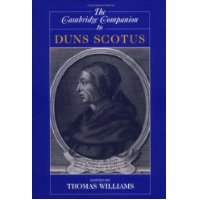The Cambridge Companion to Duns Scotus
| 商家名称 |
信用等级 |
购买信息 |
订购本书 |
|
|
 |
The Cambridge Companion to Duns Scotus |
 |
|
 |
The Cambridge Companion to Duns Scotus |
 |

基本信息·出版社:Cambridge University Press
·页码:424 页
·出版日期:2002年12月
·ISBN:0521635632
·条形码:9780521635639
·装帧:平装
·丛书名:Cambridge Companions to Philosophy
·外文书名:剑桥哲学指南: 邓斯·司各特
内容简介 John Duns Scotus (1265/6-1308) was (along with Aquinas and Ockham) one of the three principal figures in medieval philosophy and theology, with an influence on modern thought arguably even greater than that of Aquinas. The essays in this volume systematically survey the full range of Scotus's thought. They take care to explain the technical details of his writing in lucid terms and demonstrate the relevance of his work to contemporary philosophical debate.New readers will find this the most convenient and accessible guide to Scotus currently available.
编辑推荐 Review ' ... a stimulating addition to a distinguished series.' The Philosophical Quarterly 'This collection of essays surveys the full range of his thought ... It would be true to say that this is a unique overview of Scotus ... Librarians and students will find the comprehensive bibliography that concludes the volume invaluable.' Reference Reviews
Review ‘ … a stimulating addition to a distinguished series.’ The Philosophical Quarterly
‘This collection of essays surveys the full range of his thought … It would be true to say that this is a unique overview of Scotus … Librarians and students will find the comprehensive bibliography that concludes the volume invaluable.‘ Reference Reviews
Product Description Each volume in this series of companions to major philosophers contains specially commissioned essays by an international team of scholars, together with a substantial bibliography, and will serve as a reference work for students and non-specialists. One aim of the series is to dispel the intimidation such readers often feel when faced with the work of a difficult and challenging thinker. John Duns Scotus (1265/6–1308) was (along with Aquinas and Ockham) one of the three principal figures in medieval philosophy and theology, with an influence on modern thought arguably even greater than that of Aquinas. The essays in this volume systematically survey the full range of Scotus’ thought. They take care to explain the technical details of his writing in lucid terms and demonstrate the relevance of his work to contemporary philosophical debate. New readers will find this the most convenient and accessible guide to Scotus currently available.




